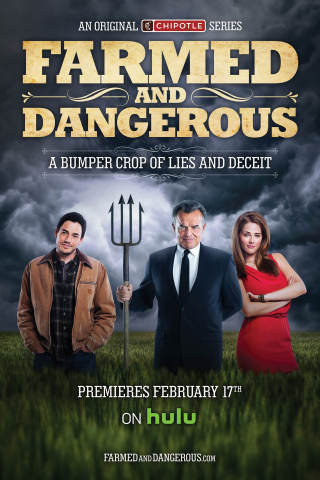
Buck and Sophia Marshall (Ray Wise and Karynn Moore, center) run the PR firm that represents megacorp Animoil. (Source: Hulu)
Earlier this week, while my roommate and I were out buying tacos, I saw an ad for the Hulu-exclusive webseries Farmed and Dangerous. It’s a four-episode satire about a father-daughter-run PR firm who represent an agricultural corporation, and their ongoing conflict with organic farmer and anti-corporate activist NAME. The weird part? The ad for the series was on my receipt. Farmed and Dangerous was created and produced by Chipotle Mexican Grill.
Farmed and Dangerous is an example of “advertainment”: original content that blurs the line between entertainment programs and commercials. It’s not exactly a new thing; Ford ran a series of shorts called Escape My Life starring Joe LoTruglio and Natasha Leggero a couple of years ago, and webseries on sites like Funny or Die will sometimes do themed or sponsored episodes. But Farmed and Dangerous is a much more expensive and aggressive attempt to sell a product by way of a genuine comedy series.
I know a lot of you are probably shaking your heads at this, but personally, I think it’s great. It’s not like television series haven’t been able to write fun bits around product placements before. If a show is worth watching, it’s worth watching, whether you buy into its advertising message or not. We’ve become more appreciative of the advertising craft in general, with stylish or sympathetic TV spots spreading across Facebook under hyperbolic headlines like “this commercial changed the way I viewed my life.” If Chipotle can make a comedy series that makes me laugh, it’s as worthy of my time as anything. What I want to examine are the different objectives the show is trying to achieve. Does it keep me watching? Does it sway me to its positions? And most importantly (I imagine), does it make me want to go eat Chipotle?
As a comedy series, Farmed and Dangerous is a little hit or miss. The series focuses on megacorporation Animoil, and their efforts to feed cows petroleum as a way to save money. After this starts to blow up in their faces (literally), PR manager Buck Marshall (Ray Wise) and his team have to spin negatives into positives, and this pits them against charming, witty farmer Chip Randell (John Sloan). Chip works with a few activism groups and seems as interested in foiling Animoil’s plans as he is in Buck’s loyal-but-conflicted (of course) daughter, Sophia (Karynn Moore). A lot of it is rather stock: Sophia slowly but predictably evolves from ruthless publicist to conscientious environmentalist, amid tension with her bossy, insensitive boyfriend, the heir to Animoil (Nick Clifford). Ray Wise is far and away the show’s strongest asset, playing the same kind of smiling, congenial devil he’s been doing for decades. He’s got strong chemistry with most of the other leads, and the writers clearly know what to do with him. As for everyone else, their scenes tend to be a little overstuffed with various zingers and puns and up-to-the-minute pop culture references. The rapid-fire jokes offset the mandatory monologues and debates between characters about the evils of GMOs and the like, but the number of punchlines that actually land is just a hair on the low side.
The cinematography, too, is a little hyperbolic, with every episode including a showoff-y gimmick or three. Here’s a shot from a GoPro on a skateboard! Here’s another montage or long low-angle sequence! Although credit where credit is due: a character’s nightmare in the fourth episode rivals the most deranged, disturbing stuff Tim Heidecker and Eric Wareheim have aired on TV. The show often feels like it’s most of the cast and crew’s first major project, but in a way that actually works to its benefit. There’s sort of a scrappiness there, as if everyone, including actors, writers, and editors, are jostling for the spotlight. I wasn’t always laughing, but there are some solid gags, clever shots, and good character beats in each episode. I doubt it would last on network TV, but as the first series of its kind on Hulu, it comes out alright.

Ray Wise’s Buck Marshall is a show highlight [Source: Hulu]
As an ad for Chipotle Mexican Grill, though, Farmed and Dangerous knocks it out of the park. Like I said earlier, Chipotle isn’t a plot point in the series itself. There’s no Chipotle analogue either, save for maybe one scene where the leads meet at a nice organic restaurant. Instead, the show’s agenda serves to explain why Chipotle cares so much about local farmers and sustainable farming practices. Rather than pushing Chipotle specifically, it sells you on the importance of eating natural, healthy ingredients. And what major Mexican food franchise just happens to focus on that stuff? Chipotle also takes advantage of the advertising space in their own show, having Buck Marshall disparage their restaurant while mentioning trivia games and contests offered through the site.
All in all, Farmed and Dangerous is an interesting, mostly successful experiment in combining straight entertainment programming with selling a mindset and brand. The show ends ambiguously enough that it’s possible we could see another set of episodes, although I doubt it’s high on anyone’s priority list. What I do want to see is more enthusiastic work from the talent involved, both in front of and behind the camera. And if this is the way some online content is going, becoming a mix of art and business, Farmed and Dangerous sets a solid base line for the genre to build on.
